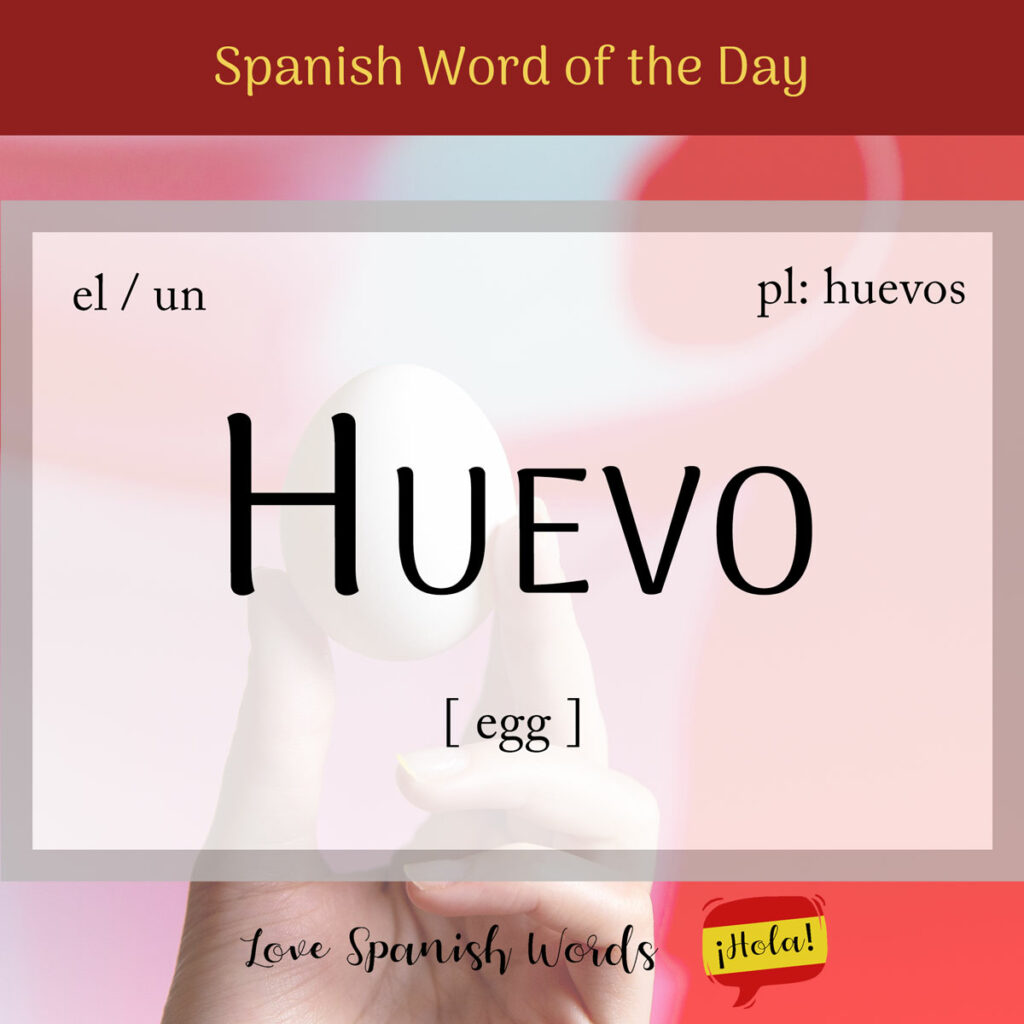Since I started lifting weights three days a week, I’ve been trying to increase the amount of protein I incorporate into my diet. Since I’m not a great meat lover, this means eating at least one huevo (egg) per day to hit my goals.
Latin American Pronunciation
European Pronunciation

Huevo is inherited from Old Spanish hueuo, which traces back to Vulgar Latin (*)ŏvum, and is ultimately derived from Classical Latin ōvum.
It is masculine noun that takes the following definite and indefinite articles:
- el huevo = the egg
- los huevos = the eggs
- un huevo = an egg
- unos huevos = some eggs
Eggs, as food, can be enjoyed in many ways, from fried eggs (huevos fritos), sunny-side-up eggs (huevos estrellados) and scrambled eggs (huevos revueltos), to poached eggs (huevos escalfados / pochados), soft-boiled eggs (huevo pasado por agua) and hard-boiled eggs (huevo duro).
Intento comer un huevo al día.
I try to eat one egg per day.
An egg yolk is known as yema de huevo (often shortened to just yema) while the egg while is called clara de huevo (or just clara).

Just as egg in English can refer to the female reproductive cell in animals, huevo in Spanish serves the same purpose. However, it’s also common to use the word óvulo in this case.
El huevo es fertilizado.
The egg is fertilised.
You may be wondering: are Easter eggs (huevos de Pascua) a thing in Spain and Latin America? Do they take part in Easter egg hunts (búsqueda de huevos de Pascua)? Well, the answer is no, not traditionally. That being said, it isn’t impossible to find chocolate eggs (huevos de chocolate) in the local supermarkets for those who wish to embrace the foreign tradition.

Because of the perceived similarity in their appearance, huevo is frequently used figuratively as a vulgar (and often offensive) term for a man’s testicle, with los huevos being the plural testicles.
Le pegaste en los huevos.
You hit him in the balls.
It’s advisable to steer clear of many of these terms, especially if you are a beginner, as some may be considered quite inappropriate. Here is just a taster of the expressions in which it appears:
- tener huevos = to have balls
- ¡un huevo! = bollocks!
- estar hasta los huevos = to have enough of something
- un huevo = a hell of a lot
- apetecer un huevo = to really want something
- chúpame un huevo = screw you
- molar un huevo = to be really cool
- morderse un huevo = to bite your tongue
- hinchar los huevos = to be a pain
- costar un huevo = to be difficult / to cost a lot
- valer huevo = to be worthless
- mamahuevo = to be a pain in the neck
- hacerle huevo a algo = to face up to something
We could easily dedicate an entire article to the multifaceted expression a huevo (sometimes written as one word ahuevo in informal writing) but we’ve decided to stick with a simple overview. (For an even more in-depth look, we suggest checking out this excellent article by Tell Me in Spanish!)
- come hell or high water / no matter what > Hoy tengo que terminar el ensayo a huevo = I have to finish this essay come hell or high water (Mexico, Nicaragua, El Salvador and Costa Rica)
- a vulgar exclamation used on its own to express agreement, to say ‘yes’ or to express happiness > ¿Vas a ir a la fiesta? ¡A huevo! = Are you going to the party? Hell, yes! (Mexico, Honduras and El Salvador)
- dirt cheap > El boleto vale un huevo = The ticket is dirt cheap (Chile, Colombia, Ecuador, and Mexico)
- with a lot of effort > Gané a huevo = I won with a lot of effort (Costa Rica and Uruguay)
- to hand on a silver platter > Yo le hice el juego a huevo = I handed the game to him on a silver platter (Spain)
Idiomatic expressions featuring ‘huevo‘
As we’ve seen, huevo appears in numerous vulgar idiomatic expressions, but it also features in many other neutral idioms, as you can see below.
Buscarle el pelo al huevo
Literal translation: to find the hair on the egg
English meaning: to nitpick, to split hairs
Pensar en los huevos del gallo
Note: this idiom is used in the Andes and Central America
Literal translation: think about the rooster’s eggs
English meaning: to daydream
Ser como el huevo de Colón
Literal translation: to be like Columbus’s egg
English meaning: to be simple / easy
Andar sobre huevos
Literal translation: to walk on eggs
English meaning: to go gingerly
Parecerse como un huevo a una castaña
Literal translation: to be as similar as an egg to a chestnut
English meaning: to be like chalk and cheese

